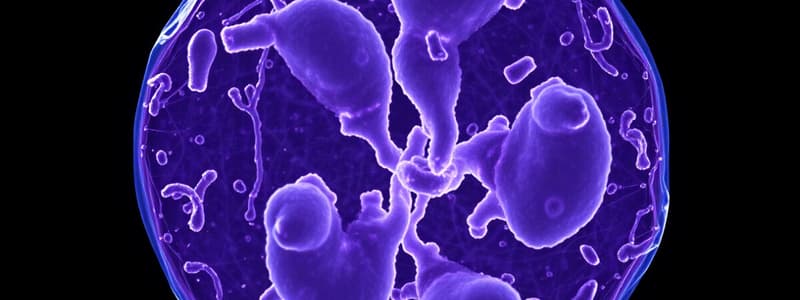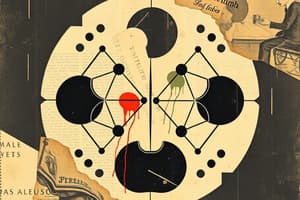Podcast
Questions and Answers
What shape do prokaryotic chromosomes have?
What shape do prokaryotic chromosomes have?
- Oval
- Circular (correct)
- Linear
- Spiral
In eukaryotic cell division, what is the primary role of mitosis?
In eukaryotic cell division, what is the primary role of mitosis?
- To replicate DNA
- To separate organelles
- To divide the cytoplasm
- To divide the nucleus (correct)
Which phase of the cell cycle is characterized by growth and metabolic activities?
Which phase of the cell cycle is characterized by growth and metabolic activities?
- S phase
- G1 phase (correct)
- M phase
- G2 phase
During which step of binary fission do chromosomes separate?
During which step of binary fission do chromosomes separate?
What happens during cytokinesis in eukaryotic cell division?
What happens during cytokinesis in eukaryotic cell division?
Which of the following correctly represents the number of chromosomes in a daughter cell after mitosis?
Which of the following correctly represents the number of chromosomes in a daughter cell after mitosis?
Which phases comprise interphase?
Which phases comprise interphase?
What is the main event during the S phase of the cell cycle?
What is the main event during the S phase of the cell cycle?
What is the significance of the G0 phase in the cell cycle?
What is the significance of the G0 phase in the cell cycle?
Which of the following statements about chromosome structure is incorrect?
Which of the following statements about chromosome structure is incorrect?
Flashcards
Prokaryotic chromosome
Prokaryotic chromosome
A circular, single chromosome located in the cytoplasm.
Eukaryotic chromosome
Eukaryotic chromosome
Multiple, linear chromosomes located within the nucleus.
Step 1 of Binary Fission
Step 1 of Binary Fission
The process where chromosomes are replicated.
Step 2 of Binary Fission
Step 2 of Binary Fission
Signup and view all the flashcards
Step 3 of Binary Fission
Step 3 of Binary Fission
Signup and view all the flashcards
Mitosis
Mitosis
Signup and view all the flashcards
Cytokinesis
Cytokinesis
Signup and view all the flashcards
Diploid
Diploid
Signup and view all the flashcards
Genetically identical
Genetically identical
Signup and view all the flashcards
G1
G1
Signup and view all the flashcards
Binary Fission
Binary Fission
Signup and view all the flashcards
G1 Phase
G1 Phase
Signup and view all the flashcards
S Phase
S Phase
Signup and view all the flashcards
G2 Phase
G2 Phase
Signup and view all the flashcards
M Phase
M Phase
Signup and view all the flashcards
G0 Phase
G0 Phase
Signup and view all the flashcards
Study Notes
Cell Division
- Prokaryotes have circular chromosomes and single chromosomes.
- Eukaryotes have linear chromosomes and multiple chromosomes.
- Chromosomes are located in the cytoplasm in prokaryotes and the nucleus in eukaryotes.
- Binary Fission steps:
- Step 1: Chromosomes separate and move to opposite poles
- Step 2: Chromosomes are replicated
- Step 3: Cytoplasm splits, resulting in identical daughter cells.
- In eukaryotic cell division, mitosis divides the nucleus, and cytokinesis divides the cytoplasm.
- Each daughter cell receives a diploid number of chromosomes and is genetically identical.
- The cell spends most of its time in interphase (G1, S, G2).
Cell Cycle
- The cell cycle phases:
- G1: Growth, metabolic activities, proteins production
- S: DNA Replication
- G2: Short period of growth, organelles produced
- M: Cell division
- The G0 phase is a resting phase where the cell no longer divides.
- Vocab matching:
- Binary fission: Prokaryotic cell division
- Parent cell: Starting cell that divides into two daughter cells
- Interphase: Where the cell spends most of its life (G1, S, G2)
- Mitosis: Results in fully separated, identical daughter cells.
- Cellular senescence: When normal diploid cells lose their ability to divide
- Cytokinesis: A new cell that results from cell division
- Daughter cell: A new cell that's formed after division
Studying That Suits You
Use AI to generate personalized quizzes and flashcards to suit your learning preferences.




